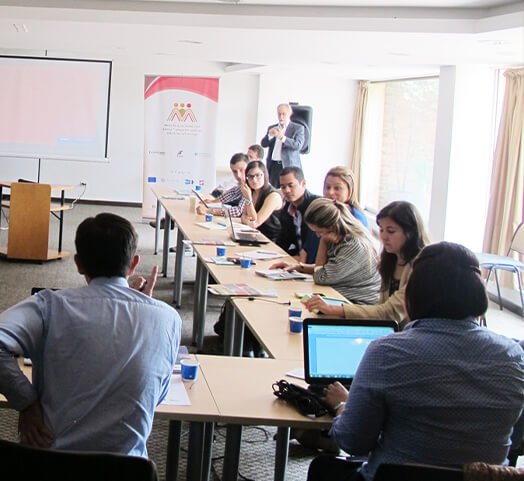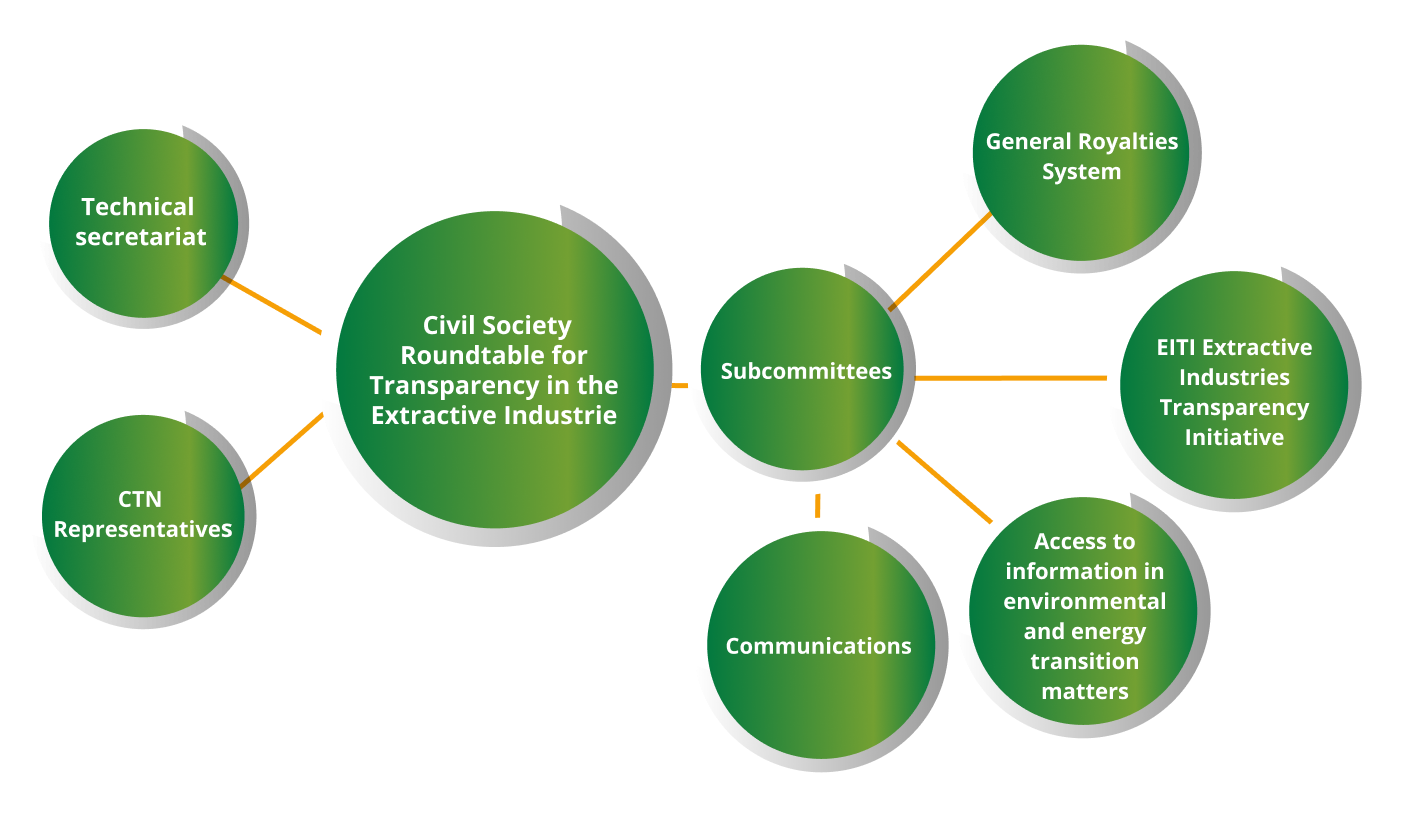What does the Roundtable do?
We promote actions to promote local and regional development.
This initiative was launched in November 2013 and brings together more than twenty social organisations and academic institutions throughout the country.
Vision
To build a consolidated and powerful civil society movement with a high degree of influence in the public and private sectors involved in Colombia's extractive industries.
Mission
To pursue greater transparency, citizen participation, accountability, and access to public information for the Colombian extractive sector.

Our principles
We have defined seven key principles that guide our actions in our different lines of work and activities.
Zero Tolerance
for Corruption
All spheres of the Roundtable’s actions are transparent.
Respect for diversity
Respect for ethnic, cultural, sexual, gender identity and religious diversities, opposing any form of discrimination.
Civic activism in the extractive sector
The Roundtable strives to promote civic activism in the extractive sector and to strengthen the participation of women, sexual diversity and gender identity, youth, ethnic communities, and minorities.
Defense and protection of member organisations
The Roundtable is committed to defending and protecting member organisations.
Strategic Alliances
The Roundtable promotes actions in favour of local and regional development from a framework of action based on free access to information, citizen participation, transparency, and the 2030 Agenda for Sustainable Development.
Intersectoral dialogue
The Roundtable strives to strengthen its activities through partnerships with local, national, and international organisations.
Free access to information, citizen participation, transparency and SDGs
Intersectoral dialogue to advocate for the demands of civil society.
Zero Tolerance
for Corruption
All spheres of the Roundtable’s actions are transparent.
Respect for diversity
Respect for ethnic, cultural, sexual, gender identity and religious diversities, opposing any form of discrimination.
Civic activism in the extractive sector
The Roundtable strives to promote civic activism in the extractive sector and to strengthen the participation of women, sexual diversity and gender identity, youth, ethnic communities, and minorities.
Defense and protection of member organisations
The Roundtable is committed to defending and protecting member organisations.
Strategic Alliances
The Roundtable promotes actions in favour of local and regional development from a framework of action based on free access to information, citizen participation, transparency, and the 2030 Agenda for Sustainable Development.
Intersectoral dialogue
The Roundtable strives to strengthen its activities through partnerships with local, national, and international organisations
Free access to information, citizen participation, transparency and SDGs
Intersectoral dialogue to advocate for the demands of civil society.
Lines of work
Boosting subnational EITI implementation:
The Roundtable considers that the Extractive Industries Transparency Initiative (EITI) will ensure open and accountable management in the Colombian extractive sector at central and territorial levels. Accordingly, it expresses its willingness to contribute to the sub-national EITI strategy and its implementation. To this end, it draws on the experience of its members in multi-stakeholder dialogue processes at local level, as well as its links with civil society groups and organisations in several of the country's territories.
Strengthening of Citizen Participation Policies in the extractive industry:
The Working Group believes that citizen participation in the extractive sector must be bolstered and be provided with its own spaces for deliberation and agreement on public policies. In this sense, the Working Group articulates the different efforts of the sector's authorities, including the Ministry of Mines and Energy and its affiliated entities, in the development and implementation of existing mechanisms to democratize decisions related to the sector's management. In general terms, it promotes the normative development of aspects including the regulation of prior consultation; the application of the principles of coordination, concurrence, and subsidiarity between the national government and the territorial entities for decision making on subsoil exploitation; and the definition of permanent and specific participation mechanisms for the sector.
Monitoring and Strengthening of Transparency Mechanisms in the General Royalties System (SGR)
With a view to reforming the SGR, the Roundtable endeavors to promote advocacy so that it maintains the highest level of transparency, oversight, and access to public information, as well as effective participation by citizens in the approval of projects financed with royalty resources.
Access to information on environmental matters:
The inclusion of environmental issues related to the extractive sector has been essential since the inception of the Roundtable. Within the framework of EITI Colombia, the Roundtable has engaged in ensuring that environmental information—including information on companies’ environmental payments— is collected and disclosed. In the context of the current situation and the repositioning of environmental concerns in the country, this issue is one of the priorities of the civil society agenda for the sector and a focus of action by the Roundtable (due to the signing of the Escazú Agreement, institutional reforms of the environmental authorities, the inclusion of the environmental expenditures of companies in the EITI standard, among others).
Boosting subnational EITI implementation:
The Roundtable considers that the Extractive Industries Transparency Initiative (EITI) will ensure open and accountable management in the Colombian extractive sector at central and territorial levels. Accordingly, it expresses its willingness to contribute to the sub-national EITI strategy and its implementation. To this end, it draws on the experience of its members in multi-stakeholder dialogue processes at local level, as well as its links with civil society groups and organisations in several of the country's territories.
Strengthening of Citizen Participation Policies in the extractive industry:
The Working Group believes that citizen participation in the extractive sector must be bolstered and be provided with its own spaces for deliberation and agreement on public policies. In this sense, the Working Group articulates the different efforts of the sector's authorities, including the Ministry of Mines and Energy and its affiliated entities, in the development and implementation of existing mechanisms to democratize decisions related to the sector's management. In general terms, it promotes the normative development of aspects including the regulation of prior consultation; the application of the principles of coordination, concurrence, and subsidiarity between the national government and the territorial entities for decision making on subsoil exploitation; and the definition of permanent and specific participation mechanisms for the sector.
Monitoring and Strengthening of Transparency Mechanisms in the General Royalties System (SGR)
With a view to reforming the SGR, the Roundtable endeavors to promote advocacy so that it maintains the highest level of transparency, oversight, and access to public information, as well as effective participation by citizens in the approval of projects financed with royalty resources.
Access to information on environmental matters:
The inclusion of environmental issues related to the extractive sector has been essential since the inception of the Roundtable. Within the framework of EITI Colombia, the Roundtable has engaged in ensuring that environmental information—including information on companies’ environmental payments— is collected and disclosed. In the context of the current situation and the repositioning of environmental concerns in the country, this issue is one of the priorities of the civil society agenda for the sector and a focus of action by the Roundtable (due to the signing of the Escazú Agreement, institutional reforms of the environmental authorities, the inclusion of the environmental expenditures of companies in the EITI standard, among others).
Boosting subnational EITI implementation:
The Roundtable considers that the Extractive Industries Transparency Initiative (EITI) will ensure open and accountable management in the Colombian extractive sector at central and territorial levels. Accordingly, it expresses its willingness to contribute to the sub-national EITI strategy and its implementation. To this end, it draws on the experience of its members in multi-stakeholder dialogue processes at local level, as well as its links with civil society groups and organisations in several of the country's territories.
Strengthening of Citizen Participation Policies in the extractive industry:
The Working Group believes that citizen participation in the extractive sector must be bolstered and be provided with its own spaces for deliberation and agreement on public policies. In this sense, the Working Group articulates the different efforts of the sector's authorities, including the Ministry of Mines and Energy and its affiliated entities, in the development and implementation of existing mechanisms to democratize decisions related to the sector's management. In general terms, it promotes the normative development of aspects including the regulation of prior consultation; the application of the principles of coordination, concurrence, and subsidiarity between the national government and the territorial entities for decision making on subsoil exploitation; and the definition of permanent and specific participation mechanisms for the sector.
Monitoring and Strengthening of Transparency Mechanisms in the General Royalties System (SGR)
With a view to reforming the SGR, the Roundtable endeavors to promote advocacy so that it maintains the highest level of transparency, oversight, and access to public information, as well as effective participation by citizens in the approval of projects financed with royalty resources.
Access to information on environmental matters:
The inclusion of environmental issues related to the extractive sector has been essential since the inception of the Roundtable. Within the framework of EITI Colombia, the Roundtable has engaged in ensuring that environmental information—including information on companies’ environmental payments— is collected and disclosed. In the context of the current situation and the repositioning of environmental concerns in the country, this issue is one of the priorities of the civil society agenda for the sector and a focus of action by the Roundtable (due to the signing of the Escazú Agreement, institutional reforms of the environmental authorities, the inclusion of the environmental expenditures of companies in the EITI standard, among others).
Organizational chart
Roundtable structure

Protocol for members of the Roundtable
We invite you to download the protocol document for the members of the Roundtable and its annex.
